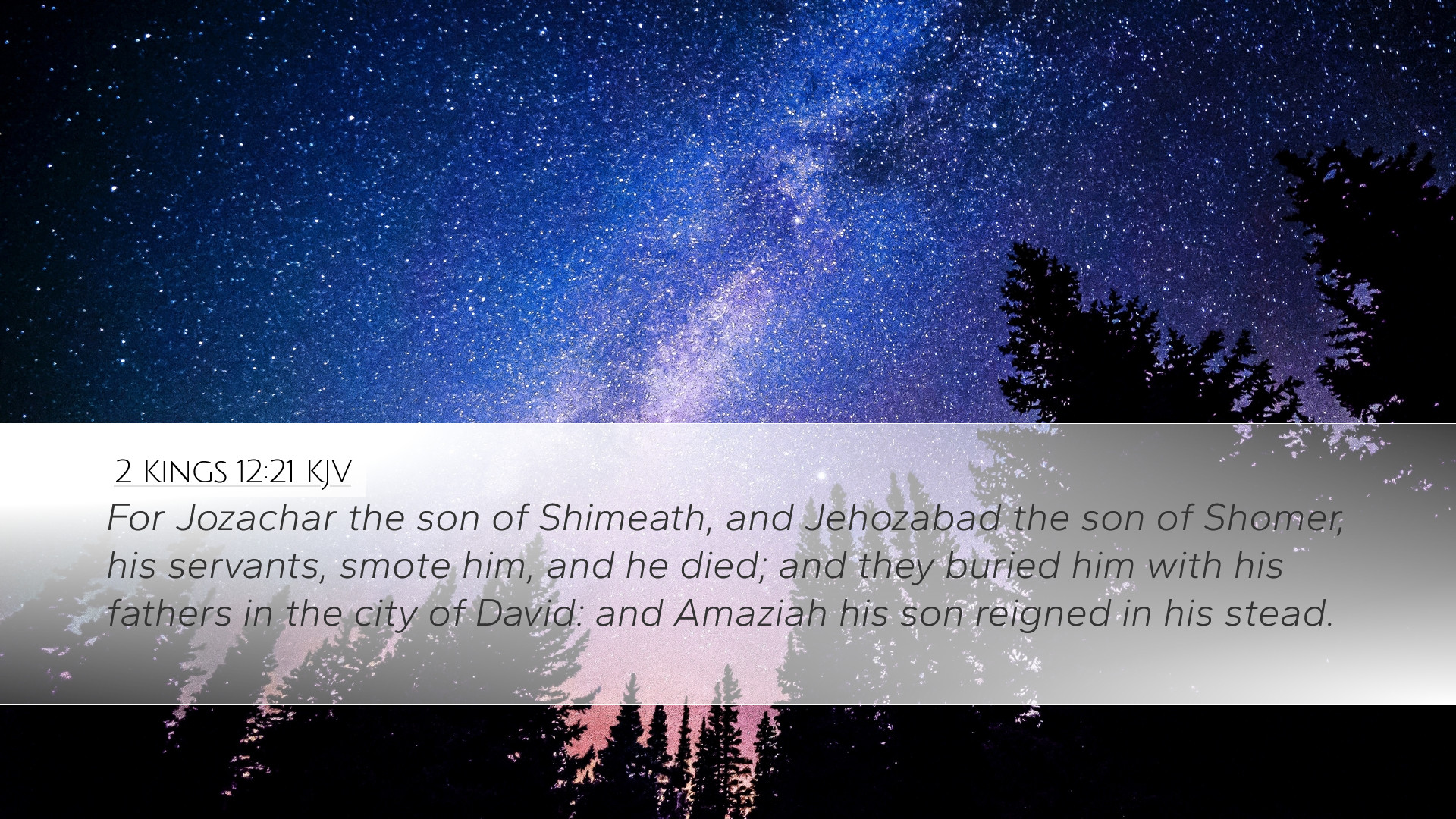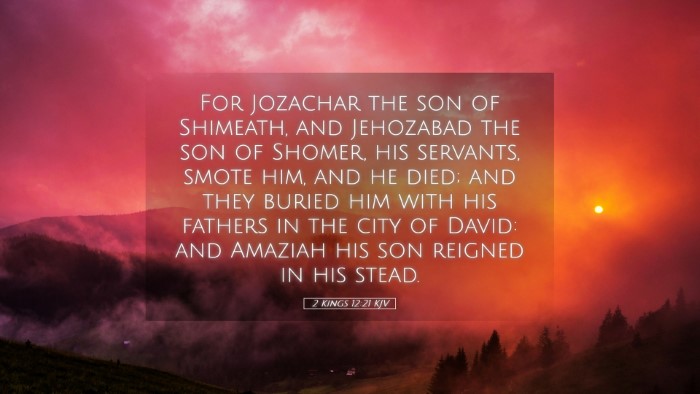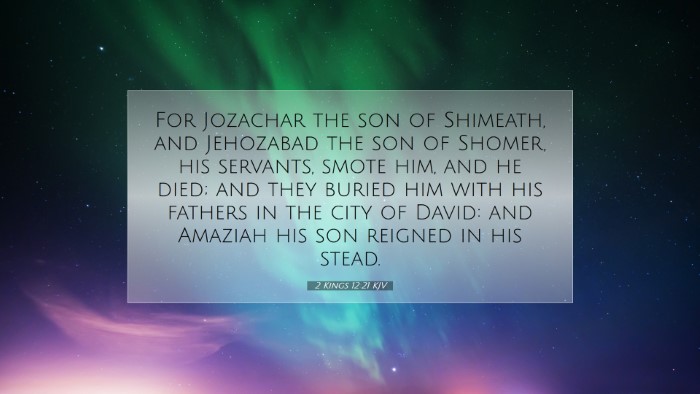Old Testament
Genesis Exodus Leviticus Numbers Deuteronomy Joshua Judges Ruth 1 Samuel 2 Samuel 1 Kings 2 Kings 1 Chronicles 2 Chronicles Ezra Nehemiah Esther Job Psalms Proverbs Ecclesiastes Song of Solomon Isaiah Jeremiah Lamentations Ezekiel Daniel Hosea Joel Amos Obadiah Jonah Micah Nahum Habakkuk Zephaniah Haggai Zechariah Malachi2 Kings 12:21
2 Kings 12:21 KJV
For Jozachar the son of Shimeath, and Jehozabad the son of Shomer, his servants, smote him, and he died; and they buried him with his fathers in the city of David: and Amaziah his son reigned in his stead.
2 Kings 12:21 Bible Commentary
Commentary on 2 Kings 12:21
2 Kings 12:21 states: "For Jozachar the son of Shimeath, and Jehozabad the son of Shomer, his servants, smote him; and he died; and they buried him with his fathers in the city of David: and Amaziah his son reigned in his stead."
Introduction
This verse encapsulates a pivotal moment in the history of Judah, marking the end of Joash's reign. It highlights the implications of leadership, the fragility of kingship, and the consequences of straying from divine principles, themes that resonate throughout biblical history.
Historical Context
Joash, also known as Jehoash, was a king of Judah who began his reign under the mentorship of the high priest Jehoiada. His initial successes and reforms, particularly in restoring the temple, are overshadowed by his eventual descent into idolatry and disobedience to God. This commentary draws on insights from historical records and ancient texts, providing a well-rounded understanding of the significance of this verse.
Matthew Henry's Perspective
Matthew Henry notes the dramatic turn of events leading to Joash's assassination. He emphasizes that Joash, who had once been zealous for the Lord and restored true worship, later failed to remain steadfast in his commitment. Henry observes that the act of murder by his servants is a testament to the consequences of Joash's disobedience, leading to a loss of support both from God and those around him.
Albert Barnes' Analysis
Albert Barnes provides a detailed examination of the political climate during Joash's reign. He points out that discontent among the people, fueled by Joash's idolatry, ultimately culminated in his downfall. Barnes discusses the significance of the names mentioned in the text, Jozachar and Jehozabad, highlighting that their involvement underscores the personal betrayal that led to the king's demise. This reflects the tension between loyalty and righteousness during turbulent times.
Adam Clarke's Interpretation
Adam Clarke focuses on the ramifications of Joash's death and the transition of power to Amaziah, his son. Clarke elaborates on the moral implications of Joash's life choices, indicating that his prior reforms were insufficient to counterbalance the spiritual decline he initiated through his later actions. He stresses that while Amaziah inherited the throne, he too would face challenges due to the legacy of his father's decisions.
Thematic Insights
This verse reveals several key themes relevant for modern readers:
- The Consequences of Leadership: The downfall of Joash serves as a stark reminder of the weighty responsibility of leaders to remain faithful to God. Pastor and scholars alike can draw parallels between Joash's journey and contemporary leadership challenges.
- Faithfulness vs. Idolatry: Joash's life illustrates the struggle between true worship and idolatrous practices. This theme encourages reflection on the nature of faithfulness in one's personal walk with the Lord.
- Generational Impact: The mention of Amaziah inheriting the throne indicates the lasting effects of a leader's choices on future generations. Students of Scripture are reminded of the enduring influence of legacy in spiritual matters.
Spiritual Application
For pastors, the lessons learned from Joash's reign provide a foundation for teaching congregations about the importance of spiritual integrity. They can use Joash's story to illustrate how a strong start does not guarantee a faithful finish. The commentary encourages self-examination in both personal and church leadership, urging leaders to seek continuous alignment with God's will.
The necessity of accountability is another profound application, reminiscent of Joash's early relationship with Jehoiada. Believers are encouraged to develop relationships that foster spiritual growth and vigilance against complacency.
Conclusion
2 Kings 12:21 serves as a somber conclusion to the life of Joash but also a profound learning opportunity for all believers. Reflecting on the insights from Henry, Barnes, and Clarke, we are called to consider our faithfulness to God, the impact of our choices, and the legacy we will leave behind. Each generation must reckon with the eternal implications of leadership and obedience to God, ensuring that they remain steadfast against the allure of idolatry in its many modern forms.


